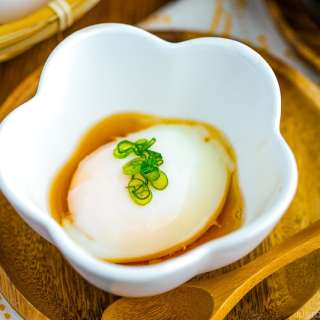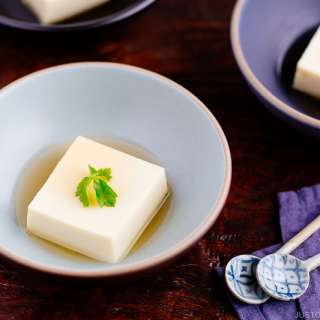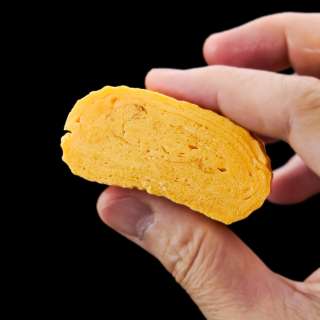
Ramen Eggs (Ajitsuke Tamago)
User Reviews
4.8
1,626 reviews
Excellent

Ramen Eggs (Ajitsuke Tamago)
Report
Ramen Eggs (Ajitsuke Tamago or Ajitama) are delicious as a topping for ramen or enjoyed as a snack. Read on to learn how to make these flavorful Japanese soft-boiled eggs at home.
Share:
Ingredients
- 4 large eggs (50 g each w/o shell) (refrigerated; use slightly older eggs, which are easier to peel)
For the Marinade
- ¼ cup soy sauce
- ¼ cup mirin
- ¼ cup sake (or water)
- 1 tsp sugar
Instructions
- Before You Start: Please note that this recipe requires a marination time of 8 hours or overnight. Gather all the ingredients.
To Make the Marinade
- In a small saucepan, combine all the ingredients for the marinade: ¼ cup soy sauce, ¼ cup mirin, ¼ cup sake, and 1 tsp sugar.
- Bring it to a boil and whisk it a few times to let the sugar dissolve completely. Once boiling, lower the heat and simmer for 1 minute. Turn off the heat. Set aside to cool completely.
To Make the Soft-Boiled Eggs
- Add 4 cups (1L) water (for 4 eggs) to a medium saucepan and bring it to a boil. There should be enough water to cover the eggs by at least 1 inch (2.5 cm). Once at a full boil, take out 4 large eggs (50 g each w/o shell) from the refrigerator. Carefully and gently lower one egg at a time into the boiling water with a mesh strainer/skimmer or a ladle. When you add the first egg, set a 7-minute timer. You can cook them 6 to 6½ minutes for a runny egg yolk and 8 to 9 minutes for a custard-like egg yolk.
- Once all the eggs are in the saucepan, lower the heat to maintain a gentle boil. Make sure the water is simmering, but not bubbling so strong that the eggs bounce around. If you want your egg yolks to be centered, gently rotate the eggs with chopsticks once in a while for the first 3 minutes.
- After 7 minutes, immediately take out the eggs and shock them in iced water for 15 minutes.
- Once the eggs are completely cool, gently crack the shell at the wide bottom end of the egg and start peeling it vertically toward the pointy top. Dip the egg in the iced water a few times to help with the peeling. Once you peel one section vertically, the rest of the shell comes off easily.
To Marinate the Eggs
- Place the eggs in a plastic bag and add the marinade to the bag. Why am I recommending a plastic bag? With a plastic bag, we don‘t have to use a lot of marinade to submerge the eggs. This marinade is used only one time for food safety reasons, so it’s most economical to prepare no more than the amount you need. If you use a container instead of a bag, it requires more marinade to submerge the eggs.
- Remove the air from the bag and use a clip or rubber band to seal the bag right above the eggs. This way, the eggs are completely submerged in the marinade. Refrigerate for 8 hours or overnight. You can rotate the eggs occasionally if you like.
To Serve
- Remove the eggs from the marinade and cut them in half lengthwise to serve. Use a piece of string, fishing line, or cheese cutter (that‘s what I used here) to cut the eggs in half cleanly. Enjoy the Ramen Eggs in bento, as a ramen topping, or as a snack sliced in half and sprinkled with furikake (rice seasonings) and shichimi togarashi (Japanese seven spice). If you want to warm up the eggs, soak the bag in warm water to bring up the temperature faster.
To Store
- Keep the Ramen Eggs refrigerated at all times. Do not freeze as the texture of eggs changes when frozen (with the exception of tamagoyaki). The ramen eggs will get saltier the longer they marinate, so take them out from the marinade after 12–24 hours (depending on your preference). Enjoy the ramen eggs within 3–4 days if your eggs are soft-boiled. If your eggs are hard-boiled, you can keep them in the refrigerator for up to a week. For food safety reasons, I do not recommend reusing this marinade with new boiled eggs. You can repurpose this marinade as a seasoning sauce for your stir-fried or simmered dishes but use it soon.
Equipments used:
Notes
Nutrition Information
Show Details
Calories
90kcal
(5%)
Carbohydrates
2g
(1%)
Protein
7g
(14%)
Fat
5g
(8%)
Saturated Fat
2g
(10%)
Polyunsaturated Fat
1g
Monounsaturated Fat
2g
Trans Fat
1g
Cholesterol
186mg
(62%)
Sodium
311mg
(13%)
Potassium
70mg
(2%)
Sugar
2g
(4%)
Vitamin A
270IU
(5%)
Calcium
28mg
(3%)
Iron
1mg
(6%)
Nutrition Facts
Serving: 4ramen
Amount Per Serving
Calories 90 kcal
% Daily Value*
| Calories | 90kcal | 5% |
| Carbohydrates | 2g | 1% |
| Protein | 7g | 14% |
| Fat | 5g | 8% |
| Saturated Fat | 2g | 10% |
| Polyunsaturated Fat | 1g | 6% |
| Monounsaturated Fat | 2g | 10% |
| Trans Fat | 1g | 50% |
| Cholesterol | 186mg | 62% |
| Sodium | 311mg | 13% |
| Potassium | 70mg | 1% |
| Sugar | 2g | 4% |
| Vitamin A | 270IU | 5% |
| Calcium | 28mg | 3% |
| Iron | 1mg | 6% |
* Percent Daily Values are based on a 2,000 calorie diet.
Genuine Reviews
User Reviews
Overall Rating
4.8
1,626 reviews
Excellent
Other Recipes
You'll Also Love
Asian Deviled Eggs (Miso Ramen Deviled Eggs)
Asian, North American, Fusion, Japanese
5.0
(12 reviews)















